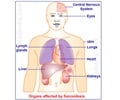Nerve–related Causes
Numbness and tingling are often caused due to a problem in the nerves.
The causes of numbness and tingling that involve nerves include:
- Peripheral neuropathy: Peripheral neuropathy is a condition where the peripheral nerves are affected by a disease condition. Common causes of peripheral neuropathy are:
- Herpes zoster: Herpes zoster is a viral infection of a nerve, caused by a virus called varicella zoster. Besides tingling and numbness, herpes zoster causes pain along the affected nerve. Small fluid-filled vesicles also develop along the nerve.
- Diabetes: Long-standing and uncontrolled diabetes can affect nerves, resulting in peripheral neuropathy. The patients may experience muscle weakness, pain, tingling, numbness and loss of sensation in the area of distribution of the affected nerve.
- Vitamin B12 Deficiency: Vitamin B12 is required for nerve function; hence deficiency of this vitamin affects nerve function and may result in tingling and numbness. This problem is more commonly observed in individuals on a strict vegetarian diet. Deficiency of other B vitamins can also affect nerve function to some extent.
- Use of certain medications: Medications like INH and rifampicin affect nerve function resulting in peripheral neuropathy.
- Exposure to toxic substances: Chronic exposure to toxic substances like lead, arsenic, mercury, and thallium result in damage to nerves. Besides, smoking and alcohol consumption could also affect nerves, resulting in peripheral neuropathy. Alcohol can cause direct damage as well as through a reduction of B complex group of vitamins.
- Carpal tunnel syndrome: Carpal tunnel syndrome is a condition where the nerves supplying to the hand are compressed at the wrist. Thus, the patient suffers from numbness, tingling and weakness of the muscles of the hand. Similarly, compression of the tibial nerve at the ankle results in tarsal tunnel syndrome, with similar symptoms in the feet.
- Tumors: Benign as well as malignant tumors can press on nerves resulting in tingling and numbness.
- Multiple sclerosis: Multiple sclerosis is an autoimmune condition where antibodies are produced against the covering of nerves, called the myelin sheath. The patient also shows other symptoms like loss of balance, muscle weakness, tremors, constipation, vision loss and depression.
- Seizures: A person with seizures may experience numbness and tingling. The symptoms may spread from one part of the body to the adjacent regions.
- Spinal cause: A condition that results in pressure over nerves exiting the spinal cord can result in numbness and tingling along the distribution of the nerve. For example, a herniated disc could compress on one of the spinal nerve. A neck or back injury may also compress nerves, resulting in tingling and numbness. The symptoms may increase with certain positions of the neck. A spinal cause usually results in tingling and numbness over a well-defined area.













